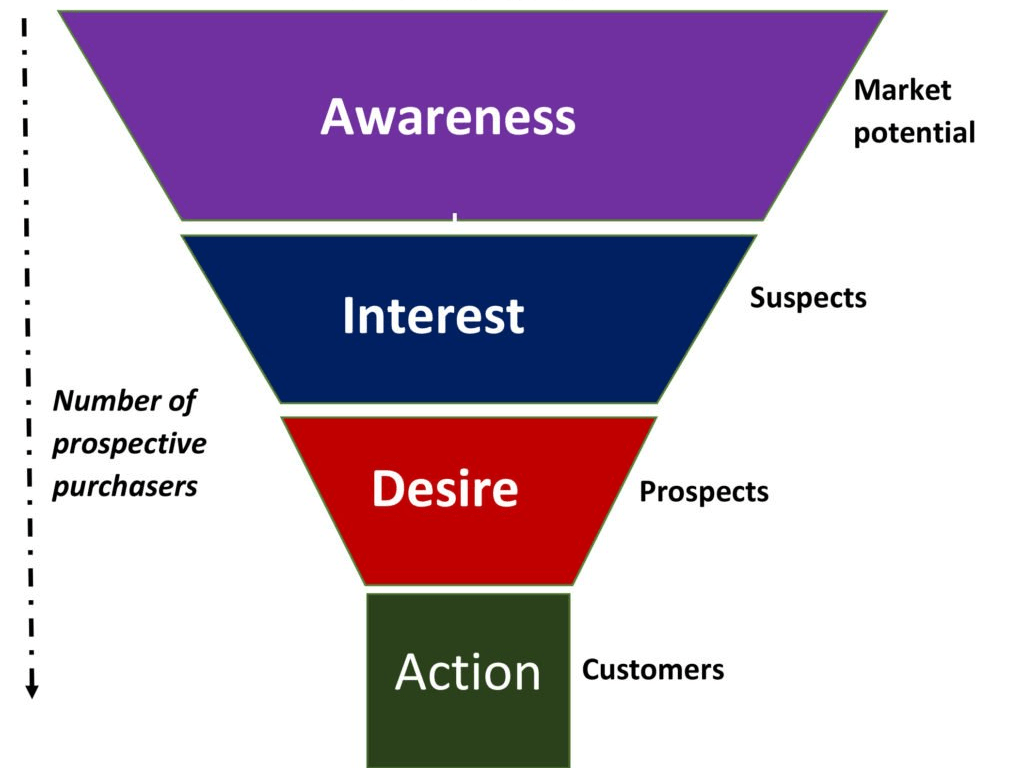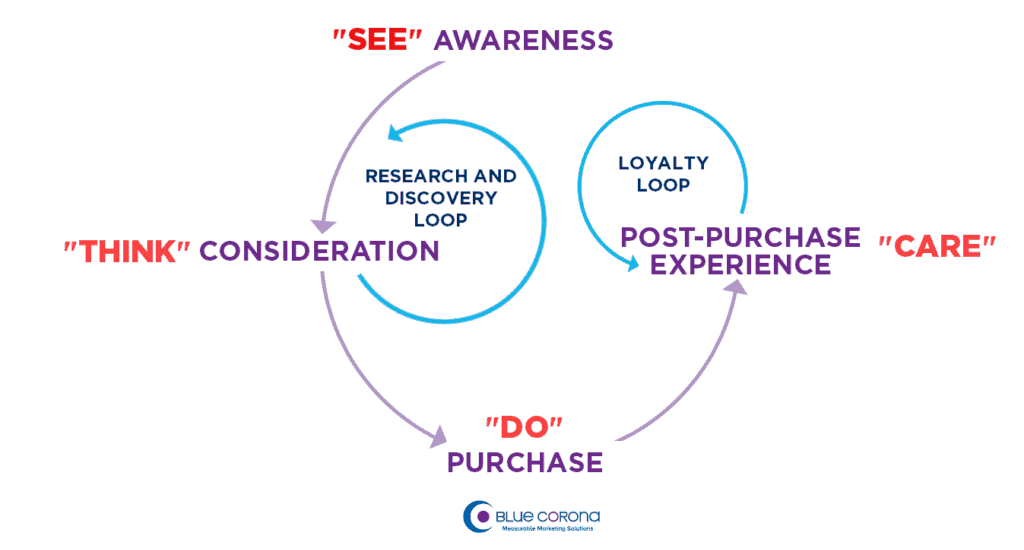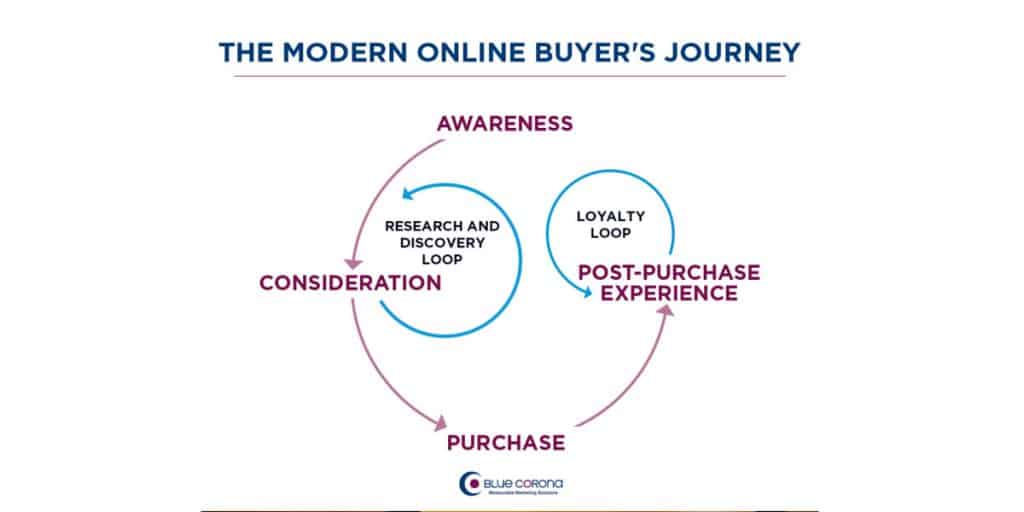The digital marketing funnel is a framework to help define, understand, and follow the different stages buyers pass through during the customer lifecycle. Traditionally, the marketing funnel has been understood as a linear journey—buyers predictably passed through one stage at a time moving through awareness, interest, desire, and finally action.
The Old Digital Marketing Funnel

Image Source – Wikipedia: The AIDA Marketing Model
Technology and society have changed rapidly and drastically since the advent of the internet and this continues to accelerate with the rise of social media and mobile devices. The way people become aware of, research, and purchase products has changed and customers in the digital landscape take more twists and turns in their path to purchasing, often looping between stages.
The new Digital Marketing funnel is more a journey that looks like this:
The Modern Buyer’s Journey

Image source – https://www.bluecorona.com
The average customer today goes back and forth looking between products and providers, sometimes many times, before making a purchase. They may search in Google, then Bing, look up reviews on websites or social media, get distracted by random videos, and then come back to do the process over again later. Once a purchase has been made the likelihood that they will come back for subsequent purchases is more dependent on the customer’s experience of your care for them than the brand-name or even the quality of the product itself. If a client feels like they have been taken care of after the purchase they will look to you first when they have more needs. Things like email updates, quick and professional support through social media, the availability of online support videos, and a positive community of co-customers are essential for retention and building your digital brand identity.
There are many different marketing strategies that can be used in this new digital environment. Good Digital Marketing will take into account your products / services, your business model and what stage(s) of the new buyer’s journey are most applicable to your customers in order to target the most effective demographics. For a startup or new line of products you will want to get your name out there so a social media campaign would make the most sense as nobody will be searching for what they don’t know exists but if you have a presence of the social media sites where your ideal demographic naturally hangs out, then they will build awareness. For a service business like a plumber or electrician a search engine optimization campaign makes more sense because when you need a plumber or if you have electrical problems you go to Google as opposed to Facebook to see who the best service providers are in your area. For a well established company a customer care campaign may make the most sense to keep brand loyalty high and arm satisfied customers to become brand evangelists.
Different digital marketing tools and platforms, like physical tools, are suited for specific jobs and need to be used as intended in order to see the best return on investment. The best digital marketing knows how to properly use these tools, doesn’t rely on gimmicks or fads, and prefers relevant numbers to high numbers.
Sample Digital Marketing Strategies and How to Best Use Them
Social Media
Social Media platforms like Facebook, Twitter, Instagram, and YouTube are ideal to get your brand out into the open so people can see you and talk about you in the digital spaces that are made for people to hang out and see and talk about things. Going a little deeper each social media platform is suited to reach different sub-demographics; Istagram, for instance, tends to appeal to the female demographic where as Facebook appeals to a general audience and SnapChat for a younger demographic. In addition to reaching different demographics each platform is suited to perform different tasks. Facebook is great for getting the word out to new customers and getting feedback and reviews from your clients but not for providing interested prospects with information or making sales conversions where as YouTube is ideal for broadcasting your brand as well as posting information and user care material but not for generating the same sort of social buzz as Facebook or getting feedback or reviews from clients.
Search Engine Optimization
Search Engine Optimization configures your website so that search engines will rank it higher so that potential customers are more likely to look at you before your competition. SEO campaigns are most effective at targeting potential customers that already know what they are looking for. Keyword research is essential as you will need to know what your potential clients are searching for and how stiff the competition is in order to properly configure your website and attract the attention of your desired demographic.
Pay Per Click
Pay Per Click is related to search engine optimization except instead of configuring your website and allowing search engines to rank you according to their algorithm the search engine puts you at the top of the list and you pay them a set amount every time somebody clicks on your ad. Pay Per Click is ideal for targeting clients who know what they want so that each click is intentionally to investigate or take action on your products / services. Pay per click is also ideal when there is competition in your field and you want to get ahead of them in Google or Bing.
Image Source: www.Kaushik.net
Email campaigns can be used to send out newsletters and other information for existing or potential clients. Email campaigns can push already interested clients to action as well as provide customer care for clients who have taken action previously,
Display
Display ads are paid advertisements that will appear all over the internet depending on the demographic targeted. Display ads appear along the side of search engines, throughout a wide variety of web pages, and can also appear in social media. The demographic and type of ad to display will vary according to which part of the buyer’s journey you want to target (see, think, do, care) and so you really have to know what your demographic is, how to attract their attention, and what you want them to do. Planning and strategic implementation will be very important.
Affiliate Marketing
Affiliate Marketing is the practice of directing people to affiliate businesses or products and receiving a commission for every sale that is generated from your link. Affiliate marketing is easy to set up and easy to use, but it only really targets prospective clients that a) already visit your website and b) are at the point of making a purchase. Businesses with high website traffic or a dedicated client base would profit the most from an affiliate marketing campaign.
Source: https://www.bluecorona.com/blog/new-digital-marketing-funnel-strategies




